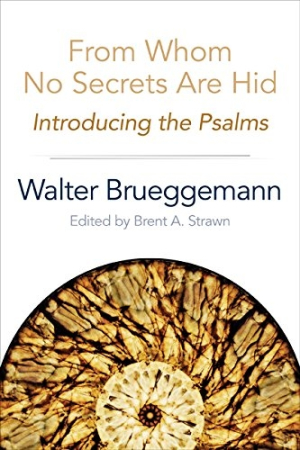From Whom No Secrets Are Hid
Introducing the Psalms
The mix of theological diction and conversational prose makes the Psalms accessible to lay readers seeking spiritual guidance.
From Columbia University’s emeritus professor of Hebrew Bible Walter Brueggemann comes a new work which brings certain of the Psalms into relief, highlighting their particular relevance for contemporary Christians. From Whom No Secrets Are Hid is an intriguing exegetical exercise certain to speak to seeking spiritual communities.
Brueggemann notes that, though the Psalms are a common feature in lectionaries, many Christians remain familiar with just a few. Exploring the Psalter in total, the book asserts, forces the reader to move beyond the comforting language of God as a shepherd and reveals a world in which God was neither solely praised nor reproved.
Much of the book is explanatory, tracing individual Psalms to their historical origins and exploring how they balance tendencies to praise, lament, and approach intimacy with the Divine. The Psalms put into conversation other books of the Bible, from the prophets of the Hebrew Bible to the Gospels. Brueggemann treats both “known” and lesser known Psalms this way, resulting in illuminating, if not comprehensive, chapters.
A section on Israel’s creative modifications of Canaanite traditions becomes both historically revealing and a site for the author to encourage continued imaginative work. He meditates on the usefulness of stark honesty even in moments of severe spiritual despair, using Psalm 88 as a guide. Always, he maintains a sense that such examples of complex prayer are useful to the modern church: “Prayer … is [also] an attempt to to mobilize social power … [It] is an act of deep, albeit irrational, trust that somehow, somewhere, there will be a way made out of no way.”
While there are a few hairy moments in the composition—a comparison of the fall of Jerusalem to the events of 9/11 doesn’t quite pan out—Brueggemann’s pages also offer flashes of beauty that render their consumption a frequent treat: “We are bound to say that in the middle of the night, it is raw, unadorned chaos—the surging sea, the incomprehensible dragon, the devouring monster—that haunts us, wakes us, or terrifies us.”
Brueggemann’s work is an interesting mix of academic theological diction and conversational prose; he trades between meditations on the doxology and “dialogical convenantalism” in the Psalter and relation of its lessons to today’s concerns. As such, the book is likely to prove most accessible to those with some background in biblical scholarship, or those who fill pastoral roles, though inroads for laity also exist throughout.
Reviewed by
Michelle Anne Schingler
Disclosure: This article is not an endorsement, but a review. The publisher of this book provided free copies of the book to have their book reviewed by a professional reviewer. No fee was paid by the publisher for this review. Foreword Reviews only recommends books that we love. Foreword Magazine, Inc. is disclosing this in accordance with the Federal Trade Commission’s 16 CFR, Part 255.

